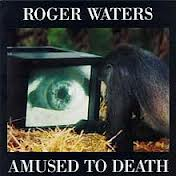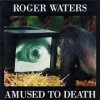 Originally published by L.S. Media. September 1st 2012.
Originally published by L.S. Media. September 1st 2012.
When looking back at the work of Roger Waters, it is of course impossible to leave aside the time he spent with Pink Floyd. The legendary Progressive Rock king’s output had been prodigious and ground breaking with Roger being the main songwriter behind some of the group’s work in the post Syd Barrett era. His solo career though, the music he created after leaving the band as the thoughts of winding up the group completely was not to be considered in the same vein and by some not fit to mentioned in the same breath as say Animals, The Wall or Wish You Were Here.
This is a shame, for as the 20th anniversary of Roger’s third studio album, Amused To Death shows, Roger was still more than able to produce an album that had the biting and general unease about humanity as he had ever been.
Ignoring The Final Cut, the last album produced by Pink Floyd before David Gilmour and Nick Mason, (with some invaluable help by Bob Ezrin and Rick Wright) got back together to make the mostly Gilmour inspired A Momentary Lapse of Reason in 1987, the band had enjoyed huge critical and public admiration for The Wall. The Final Cut to some was a step backwards and really should be considered in the scheme of things to be the first attempt at a Roger Waters solo album. Certainly Roger’s stamp is all over it, the deep loathing of waste of life during World War Two, the mental anguish and deep fascination of the madness within man that was prevalent through the majority of Pink Floyd’s work during the 1970’s sees The Final Cut deeply rooted in Waters own personal thinking.
Amused To Death should be considered more of the final part of the trilogy that began with The Wall released in1979. His previous two solo albums, the creatively superb The Pros and Cons of Hitchhiking and 1987’s Radio K.A.O.S. still had the Waters effect of making the absurd seem ordinary and slightly edgy, however between The Wall, The Final Cut and Amused To Death, ghosts of the past were challenged, confronted and left at the door of the listener still very much confused about their feelings of the power of war, religion and the conflict of mass media control and commercialism.
Once again it is a concept album, Roger really does these very well, as sometimes, as in life, a single idea is too big to place inside a three minute song. Sometimes it needs fleshing out, expanding to a point where a story, whether fact or fiction needs the dedication of a full album.
If The Wall surrounded itself with the alienation of a man driven mad by the memories of a stifling mother, an absent combat casualty of a father and the insanity of commercial superstardom, then The Final Cut is where the notions of a future confrontation, written very much in the shadow of the dark days of the cold war and the after thoughts of what now for Great Britain after the Falklands conflict, is painfully real. Amused to Death takes this one stage further again and it is humanity’s fight with itself that runs through each track.
The themes of alienation still haunt and stalk the album but it is joined by doubt, the hatred of a mass media that is as perversely controlling of 20th century as religion was to those in previous centuries and the deep fear that in the end it wouldn’t be the bomb that would kill humanity, not the quick release of the bullet but the obsession of killing time and filling life with stuff. The war has moved on to be one that is fought by mechanisation, an ability to murder someone from 3,000 miles away. No longer having to look in someone eyes, the media shows these images on television and it becomes a game. With a sense of incredible sadness at one point you can hear a child saying “I like the war, then if I can see if our sides winning or if our sides losing”, war reduced to the spectacle of a football match or a computer game.
The songs themselves, even after 20 years have the power to send chills up the spine, the lyrics and thoughts of Bill Hubbard, the hero of sorts at the start and end of the recording are so intense that it matches some of the songs on The Wall for their sheer potency. What God Wants (parts 1, 2 and 3) is as dramatic as Brick in the Wall, the solemnity of Watching T.V. is melancholic at its very best and the imagery of the Chinese atrocity at Tiananmen Square is prevalent as is the thoughts of the girl who thought that she would see the Great Wall of China come crashing down. A beautiful sadness in that unlike every other martyr in the past, this young girl’s image was captured on television. She died on T.V.
Perhaps the final brutality, the crowning glory of the album lies in the title track, the final song and climax to Amused To Death. Roger has always asked frightening questions in his music, sometimes there is no easy answer; sometimes there is no answer at all. In the song Roger asks the pertinent ultimate question on consumerism, “What is the heart life of a colour T.V., what is the shelf life of a teenage Queen? Humanity and the paraphernalia they own have exchanged places and human kind has become its own sordid entertainment.
It is quite possible to imagine Roger as the Ringmaster in this three ring circus, between consumerism, modern destructive warfare and humanity’s need to be entertained, throwing back his arms in utter disbelief and confusion as he states, “It was the greatest show on Earth, but then it was over.” The alien anthropologists who wonder why the noise that humanity has been making for thousands of years, the destruction as it has ripped itself apart with has ended and the only clues left for them to work out what has happened to us is that our shadows are huddled around the flickering light of a television. We have indeed amused ourselves to death.
Roger surrounded himself with an absolute array of talent for the album. With the likes of Andy Fairweather Low, the exceptional Steve Lukather, Katie Kissoon amongst them there was really no way this album could fail to get the message across one last time.
As anniversaries of album releases go, there are few that will be commemorated with the pang of guilt of what could happen and the realisation of what has transpired.
Ian D. Hall.
